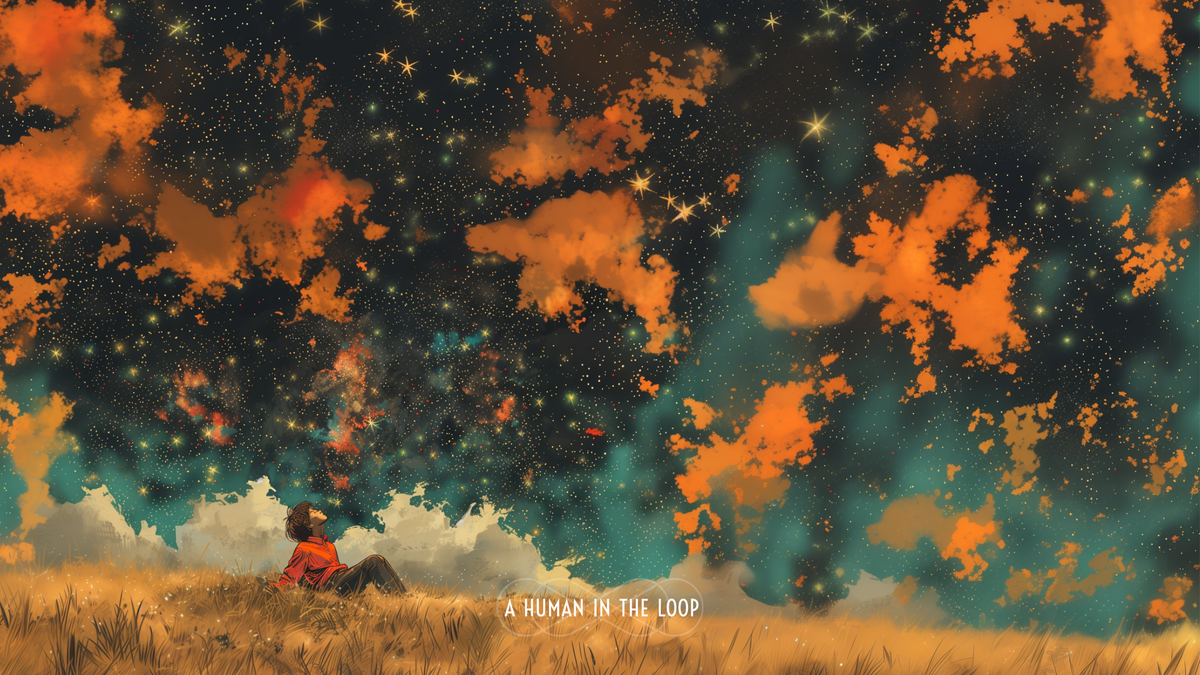From Agitation to Appreciation: How to Turn Boredom into an Opportunity for Growth
Why You Should Embrace Boredom And the Beauty of Empty Space; Part 2 of a 6-part Series on Personal Growth.

Embracing Boredom and The Beauty of Empty Space | Part 2 of a 6-part series for anyone who feels adrift and needs direction.
If you’ve arrived at this piece first, I suggest reading Part 1 before you dive into this article.

#2 Embrace Boredom
Was it really that difficult?
You take the thing out of your basket, slide it over the scanner — not so fast as to insight the automated voice to publicly shaming you for theft—and then put the item in the bag.
Waiting in the self-checkout line, I tried to ignore the grumbling frustration of my inner voice — intolerant of inefficiency.
It took every bit of restraint for me not to snatch the box of cereal out of their hands — the barcode obviously on the bottom — and scan it myself.
Instead, I did the thing we do whenever we’re forced to wait — I took out my phone. Like a mother distracting her child with a plush toy or a binky, I was attempting to self-soothe.
I had no goal or real agenda, but at least it would deter me from audibly sharing my thoughts on automation and labor economics in the context of self-service checkouts as a failed cost-saving exercise.
I hate waiting. And the truth is I would have had the same response standing in any line.
In the moments that are out of my control, my phone gives me something to focus on, something to do to pass the time. But why?
Why do I, in those little moments of pause, have to fill the void?
In the perpetual influx of info-stimulation, we recoil at the thought of being bored. I often feel, in the absence of activity, a restless agitation that is hard to tolerate.
I must fill the gaps between the doing of the things.
I’d like to believe I am being productive. Turning my annoyance into a learning opportunity. I am being productive, and that's a good thing, right?
We’re told that we must maximize our free time—including the minutes we spend waiting in line—by consuming news and content, playing games, and finding activities, hobbies, and side hustles to enrich our lives.
But do we really benefit from this kind of consumptive productivity? What do I gain transfixed to my screen while I ignore my agitation, calling out like a crying baby longing to be held?
We fill our days, but are we ever fulfilled?
It’s like I’m loading up my plate at a Golden Corral to justify spending the $16.99 for over 150 buffet items.
We’re overfed and undernourished.
You might be asking yourself, "Eric, WTF does this have to do with boredom?"
To embrace boredom, we must identify its root cause and how it manifests for each of us. We've created a world of stimulating distractions where our attention is being pulled in multiple directions at any given moment.
I want us to find a way forward that accepts the reality of the world we live in while pushing against the common narrative to create some space for us to get what we need.
Why do we get bored, and what does our response to it say about us?
Turning away from moments of boredom towards distraction and avoidance denies us a chance to grow, feel, and attend to our inner world — the parts of us that cry out desperately wanting to be held.
Boredom is not a monolith.
The experience of boredom is defined as the often unpleasant state of having a lack of interest or difficulty concentrating on an activity. Boredom is defined as the often unpleasant state of being uninterested or having difficulty concentrating on an activity, along with feelings of agitation, stress, and lethargy.
Like sitting in discomfort, being bored sucks. But the experience of it can be different for us all.
People with ADHD can attest to the wide array of feelings associated with the experience of boredom as it relates to overstimulation from the constant flood of input we receive every minute of every day.
In behavioral psychology, boredom is differentiated into 5 types.
Each type manifests with distinct characteristics, valence (positive or negative emotional associations), and implications.
- Indifferent Boredom
A neutral or slightly positive form of boredom, where the individual is disengaged from their current activity but not in a state of high arousal or distress.
- Calm, detached, or indifferent
- Slightly positive valence, very low arousal
- “I feel calm and cheerful,” or “I’m tired, but it’s pleasant.”
2. Calibrating Boredom:
There’s a restlessness and a desire for change but without a clear direction for that change.
- Feeling uncertain, mind wandering, or open to distraction
- Slightly negative valence, relatively low arousal
- “I don’t know what to do,” or “I wouldn’t mind doing something else, but not sure what.”
3. Searching Boredom
This type is marked by a restless and active search for change or engagement. Individuals experiencing this type want to escape the current state and actively look for something else to do.
- Negative valence, higher arousal
- Feeling restless, actively seeking alternatives
- “I want to get up and find something to do,” or “I keep thinking about things I’d rather be doing.”
4. Reactant Boredom
This is an intense form of boredom characterized by a strong motivation to escape the situation. Individuals may also exhibit aggression or anger. There is a tendency towards negative outcomes, such as hostility towards the source of boredom or impulsive behavior.
- High negative valence, high arousal
- Strongly wanting to leave, feeling irritated
- “I have to get out of here,” or “This is aggravating and stressful.”
5. Apathetic Boredom
This type is particularly concerning, as it has been associated with decreased well-being and mental health issues. It reflects a state of disengagement not just from activities but from life’s interests and motivations. Apathetic boredom is similar to depression, characterized by feelings of helplessness and low arousal. Individuals may feel indifferent but with a more pronounced negative emotion akin to a sense of despair.
- Very negative valence, very low arousal
- Feeling unable to change the situation, depressed
- “There’s nothing I can do to make this better,” or “I feel trapped in this boring activity.”
Recognizing what type of boredom you’re experiencing at the moment may unlock the door to understanding how to address it.
For me, it is the waiting-in-the-checkout-line agitation that aligns with the Reactive type. It gnaws at me — a deep irritation I can project outward — a behavior I’ve actively been working to correct.
In my life, the people closest to me can attest to the sharp and jagged shrapnel of emotions I can unleash in these moments of extreme agitation. To them, I apologize for that.
Every moment, however brief, is an opportunity for change.
If we consider the associated emotions, be it agitation or lack of interest, as information or our body’s way of signaling we’re in need, there is an opportunity to adjust our reactions.
While there isn’t a one-size-fits-all protocol for addressing each type of boredom, psychological research, and therapeutic practices offer strategies that can be tailored to respond to or mitigate the different types of boredom.
Here are some approaches for each type that might be relevant ways for responding.
I do want to take a moment to acknowledge that while the concept of boredom may feel trivial, it can easily mask deeper psychological conditions.
If you feel you are in need of help, seek it if you’re able, and if you are concerned about someone in your life, do not wait for them to come to you.
If you or someone close to you is experiencing deep depression or suicidal thoughts, please text or call 988 or use the chat function at 988lifeline.org.
If this is a medical emergency or there is immediate danger of harm, call 911 and explain that you need support for a mental health crisis.
Ways to Embrace Boredom
- Indifferent Boredom: Since indifferent boredom is relatively benign, interventions might focus on maintaining this calm state while gently introducing stimulating activities. Mindfulness practices and engaging in low-effort creative tasks can enrich this state without being overwhelming.
- Calibrating Boredom: Encouraging curiosity and exploration can be beneficial. Activities like journaling, brainstorming, or trying out new hobbies can help channel restlessness into productive or creative outlets. The key is to provide opportunities for engagement without pressure.
- Searching Boredom: Approaches For those actively seeking new stimulation, structured activities or setting specific goals can help direct their energy positively. Encouraging participation in group activities, sports, or community services can satisfy the desire for change and provide meaningful engagement.
- Reactant Boredom: A change of environment, taking up new challenges, or engaging in physical activities that can help channel energy and reduce stress. Cognitive-behavioral strategies (CBT) might also help in managing aggression or irritability.
- Apathetic Boredom: Given its similarity to depressive states, apathetic boredom may benefit from professional intervention. Therapy, counseling, or engagement in structured programs designed to boost motivation and energy can be effective. Mindfulness-based stress reduction (MBSR) and cognitive-behavioral therapy (CBT) are potential approaches to address the underlying feelings of helplessness and despair.
Ultimately, the treatment or response to boredom is highly individualized, depending on the person’s needs, the context of their boredom, and the underlying causes.
Across all types, it’s important to recognize the experience of boredom as an opportunity for growth and self-discovery — reassessing your needs, interests, or values.


The Beauty of Empty Space
While the world continues to move on (some days faster than others), our relationship with productivity, output, and constant stimulation – amplified by greater access to technology, turns us in a direction away from ourselves.
But what do we do if we don't have the time or mental space to dedicate to being bored?
There is a concept from Buddhist teachings that can be observed in Japanese cultural aesthetics. Yohaku no bi translates to “the beauty of empty space.”
It is the appreciation for negative space, honoring the moments in between.
Yohaku no bi can be observed in contemporary Japanese architecture and design, as well as traditional Japanese art and gardening practices.
In the void of color, texture, and fill, we find a counterbalance — an appreciation for the complex details and fullness of the piece, be it artwork or an elaborate garden.
Like rests between musical notes, Yohaku no bi reminds us that there is something quite powerful about emptiness, pause, and Yohaku no bi quiet.
Without pause, music becomes chaotic — a cacophony of noise that overwhelms and agitates us. Even a low humming sound starts to drone on and is forgotten.
It allows us to appreciate the notes before and after.
Constant stimulation is overwhelming and deprives us of space for creativity, self-reflection, and mental rest.
Boredom gives us a moment, however brief, to breathe, reflect, and digest the experiences of life.
Turning away from moments of boredom toward distraction and avoidance denies us a chance to grow, feel, and attend to our inner world—the parts of us that cry out desperately for being held.
Embracing Boredom means to welcome those moments of emptiness with open arms.
I hope you can begin to see the moments of boredom in your day as something not to run away from but something to hold dear.
I appreciate you taking the time to read my work. If you enjoyed this piece, share it with the people in your life who you think would enjoy it. Paid subscribers can share their takeaways and feedback in the comments.
If you’re ready for part 2, here you go:

One more thing

Affiliate Link







